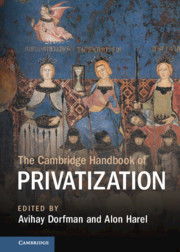Book contents
- The Cambridge Handbook of Privatization
- The Cambridge Handbook of Privatization
- Copyright page
- Contents
- Figures
- Tables
- Contributors
- Acknowledgments
- Introduction
- Part I On the Virtues of Public Provision (Agency-Based Approaches)
- 1 The Wrong of Privatization: A Kantian Account
- 2 Privatization, Efficiency, and the Distribution of Economic Power
- 3 Public and Private Ownership in Plato and Aristotle
- 4 Privatizing Criminal Punishment: What Is at Stake?
- 5 Justice and the Market
- 6 Outsourcing Border Control: Public Agency and Action in Migration
- 7 The Moral Neutrality of Privatization as Such
- Part II On the Virtues of Publicness as a Means to the Realization of Procedural Values (Process-Based Theories)
- Part III Outcome-Based Theories: On the Virtues and Vices of Public Provision as a Means to Promote Efficiency and Justice
- Index
3 - Public and Private Ownership in Plato and Aristotle
from Part I - On the Virtues of Public Provision (Agency-Based Approaches)
Published online by Cambridge University Press: 27 August 2021
- The Cambridge Handbook of Privatization
- The Cambridge Handbook of Privatization
- Copyright page
- Contents
- Figures
- Tables
- Contributors
- Acknowledgments
- Introduction
- Part I On the Virtues of Public Provision (Agency-Based Approaches)
- 1 The Wrong of Privatization: A Kantian Account
- 2 Privatization, Efficiency, and the Distribution of Economic Power
- 3 Public and Private Ownership in Plato and Aristotle
- 4 Privatizing Criminal Punishment: What Is at Stake?
- 5 Justice and the Market
- 6 Outsourcing Border Control: Public Agency and Action in Migration
- 7 The Moral Neutrality of Privatization as Such
- Part II On the Virtues of Publicness as a Means to the Realization of Procedural Values (Process-Based Theories)
- Part III Outcome-Based Theories: On the Virtues and Vices of Public Provision as a Means to Promote Efficiency and Justice
- Index
Summary
The privatization of publicly owned and operated industries and services that has occurred in certain countries over the last forty or fifty years is routinely condemned on the political left, yet the grounds of that condemnation often remain unspecified. This is perhaps unsurprising, given the practical advantages of what Cass Sunstein has called “incompletely theorized agreements” in facilitating collective action. But the advantage of distinguishing between different kinds of objections is that doing so allows us to assess their implications independently and therefore weigh and balance different factors in our practical reasoning. Sometimes we might want to object to privatization on straightforward economic grounds: when Chicago sold its parking meters on a seventy-five-year lease for just $1.15 billion, giving up a long-term revenue stream in order to balance the budget for just one year, it seemed less like selling the family silver than selling the family silver mine.
- Type
- Chapter
- Information
- The Cambridge Handbook of Privatization , pp. 52 - 68Publisher: Cambridge University PressPrint publication year: 2021

